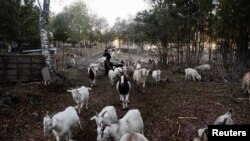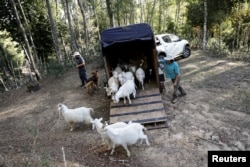In the southern Chilean city of Santa Juana, hit hard by wildfires earlier this year, locals have a special taskforce helping fight blazes: a herd of goats.
The goats have already saved the native forest of the Bosques de Chacay once in February, preventing the park from being consumed by forest fires - fueled by heatwaves and a punishing drought - that left dozens dead, thousands injured and almost 440,000 hectares destroyed in south-central Chile.
"The park was surrounded by fires, but it ended up being the only green spot left," said Rocio Cruces, cofounder of the 16-hectare (40-acre) park, and "Buena Cabra," a project that uses goats to build firebreaks.
The technique, also used in Portugal and Spain, relies on grazing goats to control dry pastures and other vegetation that fuel forest fires in the summer. Goat droppings also help enrich the soil and prevent further erosion.
"The fire reached our forest but only the first line of trees was really affected, less than 10% of the park," Cruces said, adding that small fires broke out but did not advance due to minimal brush.
Cruces started the project after deadly wildfires in 2017. Her flock has since grown from 16 goats to 150 and she hopes to inspire others to follow suit.
"In Chile we are failing in fire prevention," said Francisco Di Napoli, a forestry engineer from the University of Concepcion in Chile who is familiar with the technique, known as "strategic grazing."
"These animals can help us a lot," Di Napoli said, adding that other organizations should "evaluate where it can be applied, find where there's fuel and have the goats eat it."






